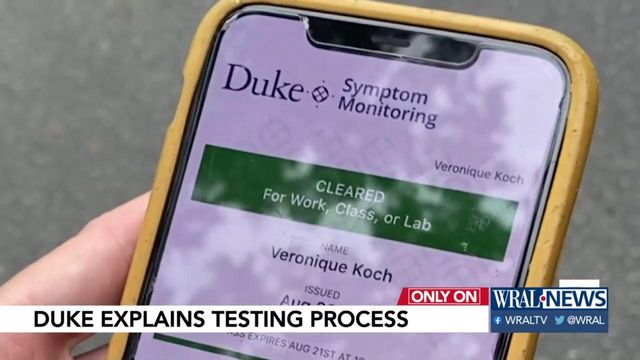Random testing helping keep coronavirus at bay on Duke campus
Duke University students have been back on campus for about a month and have not reported a single cluster of coronavirus cases. The situation at Duke has been vastly different than at other schools in North Carolina and around the country.
Posted — UpdatedPart of the reason is testing, including how often it happens and who gets it.
WRAL Durham reporter Sarah Krueger is a graduate student at Duke. She explained that on Wednesday, she received a text saying she had to come to campus on Thursday to get a coronavirus test.
Duke officials explained that in addition to testing students who report symptoms in the university’s app and testing students as they return to campus, the university is also focusing on testing those who are reporting no symptoms.
Duke is known for its medical research and science labs. Those labs are helping the school stay ahead of coronavirus.
"It's not cheap, and I will say, it's not easy," said Mike Schoenfeld, the chief communications officer for Duke, adding the university has tested about 7,000 people just last week.
Every day, students are required to submit their symptoms or lack of symptoms in an app.
"The more we can do to catch that, and to catch that early, the safer the rest of the population will be," explained Schoenfeld.
He added that the testing is not random. Duke experts in math, biology and epidemiology select students for testing based on a number of facts like where they live and work.
The university had developed a way to do rapid testing. They group samples together from five people and test them all together. If someone in the group tests positive, they'll isolate to know who it is, but if everyone's negative they can just move on.
"We actually added new equipment. There are robots involved. There are all kinds of cool stuff that allows it to be done quickly and efficiently in a single place," said Schoenfeld. "It is survive and advance. So far, we have been doing what we had hoped and promised and said that we were going to do.”
Duke student Anthony Salgado said he was impressed with how the university is handling things.
"Now we're being tested, I think, two times a week, most of us," he described.
He also said he was impressed with his classmates.
"We did have issues in the beginning. There were a few large gatherings, but I think the culture almost shifted. People were looking down on that," described Salgado. "I feel like the reason why we're doing great is because the people here are great and the people here are taking it seriously."
Krueger said the test was self-administered and only took a few minutes.
Officials said on average, students will be tested about once a week.
• Credits
Copyright 2024 by Capitol Broadcasting Company. All rights reserved. This material may not be published, broadcast, rewritten or redistributed.






